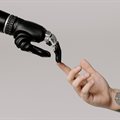The South African Artificial Intelligence Association (SAAIA) has called on the Information Regulator to investigate the use of South African user data by LinkedIn to train its artificial intelligence (AI) models without prior consent. This comes as the association seeks to promote responsible AI practices, ensuring that AI developments do not infringe on individual rights, particularly when it comes to the processing of personal data.

Source: Microsoft Designer
SAAIA’s submission highlights concerns over LinkedIn’s use of South African users' personal information, arguing that it may not comply with the Protection of Personal Information Act (POPIA).
“The race to build new AI products and services is a global one, but its impacts are local,” explained Dr Nick Bradshaw, founder of SAAIA, in a media statement.
“We believe it’s crucial that individuals and nations are not disadvantaged in both the short and long term when it comes to the use of personal data in AI training.”
The association contends that LinkedIn's actions violate POPIA’s requirements for lawful data processing and may interfere with individuals' rights under section 73 of the Act.
“This is more than just a legal matter. It's about protecting individual rights in an age where data is currency. SAAIA’s mission is to ensure that as AI grows, it becomes more accountable,” affirmed Nathan-Ross Adams, SAAIA’s head of regulatory affairs.
Balance ethics with economic development
While SAAIA advocates for responsible AI practices, the potential of AI to drive South Africa’s development has been firmly endorsed by the GNU and AI is being accelerated from a policy level.
Minister of Communications and Digital Technologies, Solly Malatsi, recently spoke at the Southern Africa Telecommunication Networks and Applications Conference (SATNAC), where he discussed the role AI could play in shaping the country’s future:
AI is no longer a futuristic dream; it is here, shaping our present and defining the contours of our future.
He outlined the government’s efforts to drive AI adoption, such as the AI Institute of South Africa (AIISA) and the Centre for Artificial Intelligence Research (CAIR).
According to Malatsi, these initiatives aim to harness AI to boost economic growth and empower South Africans with advanced technological tools.
Be responsible
However, Malatsi also acknowledged the importance of deploying AI in a responsible manner:
AI has the potential to uplift – but only if we ensure it is deployed responsibly. It is our duty to create an AI ecosystem that respects privacy, human rights, and the dignity of every South African.
SAAIA jives with this sentiment in its call for a broader societal debate on the ethics and accountability of AI.
“No one should be left behind in the race to embrace AI,” said Bradshaw.
“The opportunities presented by AI should be underpinned by the principles of responsible AI and benefit all citizens, not just a select few.”
Public participation
As South Africa continues its journey towards becoming an AI-driven economy, balancing innovation with ethical practices remains crucial.
While the SAAIA’s media statement can be seen as a publicity stunt, the Information Regulator’s response to the complaint will play a key role in shaping the future of AI governance in the country.








































